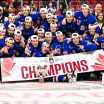CHICAGO-- The Chicago Blackhawks were in disarray in the fall of 2007, having qualified for the Stanley Cup Playoffs once in the past nine seasons and ranking 29th of 30 NHL teams in attendance in 2006-07.
Fresh in the owner's suite was Rocky Wirtz, son of late owner Bill Wirtz, and unpacking in the president's office was John McDonough, who had been lured to the Blackhawks after 24 years with baseball's Chicago Cubs.
Savard, Hull, Esposito, Mikita reconnect with Blackhawks
Legends thrilled to bridge past, present for Chicago fans as ambassadors
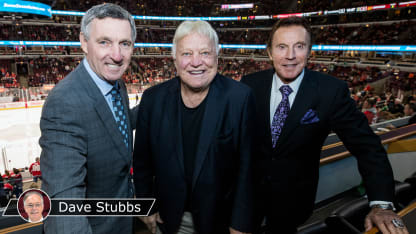
And what a remarkable turnaround was at hand for Wirtz and McDonough, who are at the 10th anniversary of their first steps together to rebuild the Blackhawks.
With a to-do list the length of a rink, the two men put an asterisk on an item near the top that had nothing to do with the product on the ice. But it was something they viewed as an absolute necessity: to bridge the Blackhawks' past and present with an eye toward a promising future (Chicago would win the Stanley Cup in 2010, 2013 and 2015).
It was long overdue, Wirtz and McDonough say, for the organization to reach out to and reconnect with a handful of the greatest players to have worn Chicago's famed crest and welcome them back into the Blackhawks family.
Hall of Famers who starred in Chicago from the 1950s into the 1990s -- forwards
Bobby Hull
and
Stan Mikita
, in December 2007; goalie
Tony Esposito
, in February 2008; and forward
Denis Savard
, in November 2008 -- returned to the Blackhawks as team ambassadors, a move that addressed old, and in some ways, unhealed wounds in the players and many in the fan base.
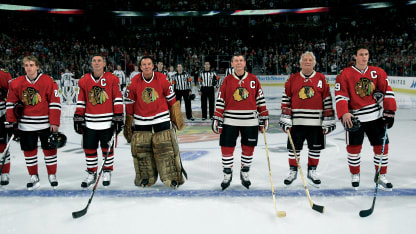
All four are on the list of the
100 Greatest NHL Players
, chosen as part of the League's 2017 Centennial celebration. But they are even greater to Blackhawks fans. These four men, whose jerseys have been retired by the organization, were the heart and soul of their Chicago teams, part of the fabric of the city.
Over two recent evenings -- at a Blackhawks game Dec. 3 and at an annual meet and greet with season ticket holders the following night -- it was clear how overwhelmingly popular the legends are with fans. That is true of those who saw them play and of those who did not but know of their accomplishments and their devotion to an organization whose previous management let them drift away.
Mikita, still strong physically at age 77, no longer is seen at Blackhawks games or functions. In January 2015, he was diagnosed with Lewy body dementia, a brain disorder that has severely affected his memory.
To McDonough, Mikita is every bit the equal of his fellow ambassadors.
"Stan is in our hearts every single night," McDonough says during a half-hour game-night talk in his United Center office.
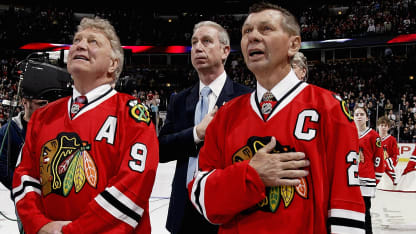
© Bill Smith/Getty Images
An hour before the Blackhawks play the Los Angeles Kings, Hull, Esposito and Savard are in the corridors of the executive offices, chatting and joking with staff. Each of the four ambassadors has a conference room named for him on this floor.
Their evening would continue in Suite L36, where they'd spend the game with invited team sponsors, making a first-intermission stop in McDonough's suite a few doors down to visit with the president's guests.
Hull's separation from the Blackhawks had been especially bitter. "The Golden Jet" had played 15 seasons with the Blackhawks before contract talks went nowhere and he bolted in 1972 to join the Winnipeg Jets of the fledgling World Hockey Association.
Esposito's 15 seasons with Chicago ended ingloriously in the summer of 1984 when then-general manager Bob Pulford did not offer him a contract, without one word to the Blackhawks' cornerstone goaltender. Esposito quietly retired, finding his way into management with the Pittsburgh Penguins and Tampa Bay Lightning.
Savard's situation wasn't as unsavory. After 13 seasons as a Blackhawks player and less than a month after being fired as Chicago's coach, replaced four games into the 2008-09 season by current coach Joel Quenneville, he was hired by Rocky Wirtz and McDonough as an ambassador.
Mikita is the only of the four ambassadors to have spent his entire NHL career for the Blackhawks. He played in 1,394 games over 22 seasons and, with Hull, was a member of the 1961 Stanley Cup champions. For decades, like Hull and Esposito, Mikita felt uncomfortable, even unwelcome, at Blackhawks games, left to wither on the vine in retirement.
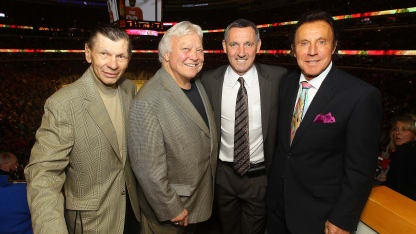
© Bill Smith/Getty Images
"It has been a long wait to be asked back and I'm thrilled," Mikita said in December 2007 upon the announcement that he and Hull were returning. "I know these young Blackhawks are as excited as I am to be a part of this great organization."
During conversations at the game and the season ticket holders event, it was apparent how delighted Hull, Esposito and Savard are to be part of the Blackhawks' family again, Hull and Esposito having a decade ago figured that their burned or crumbled bridges to the organization were beyond repair.
It was of paramount importance to Wirtz, 65, and McDonough, 64, that those bridges be rebuilt, out of respect for the players, Chicago fans and the betterment of the organization as a whole.
Rocky Wirtz assumed leadership of the Blackhawks shortly after Bill Wirtz's death in late September 2007. To that point, Rocky had had very little to do with hockey, focused on running many of the giant Wirtz Corporation's myriad holdings. But what he brought to the Blackhawks a decade ago was a populist style and progressive management hand that was critically needed by the struggling team, a hand much unlike those of the two old-school hockey and businessmen who had preceded him: his father, and before him, his grandfather, Arthur.
"I respect the decisions they made," Wirtz says, speaking of his late father and grandfather. "At the time, they made them for the right reasons. They always put the team first. But you know, you can't save yourself to prosperity. I always looked at it like you have to grow your top line (gross sales).
…
"We're in different times now. You have to manage your top line and you can't do that by cutting costs. Maybe in the past, [Bill and Arthur Wirtz] were looking more at expenses than revenue."
Rocky Wirtz is probably equal parts owner and fan when it comes to the Blackhawks, especially regarding their four ambassadors.
"It means everything to have them as part of our family," he says. "It's like if you haven't been invited to Thanksgiving dinner for a number of years and all of a sudden, the past is the past and you're part of the family, as much a part of that Thanksgiving dinner as anyone else. What's nice is that these men will do anything we ask and anything they can do to grow the sport of hockey and promote the Blackhawks. They don't have to spend the kind of time they do and they will do it without ever asking about hours, if the line is too long for autographs.
"The Blackhawks, being one of the NHL's Original Six teams, are lucky to have a pedigree. These Hall of Famers give us something that few can have. Teams can go out and try to buy a pedigree but we're lucky enough to have one."
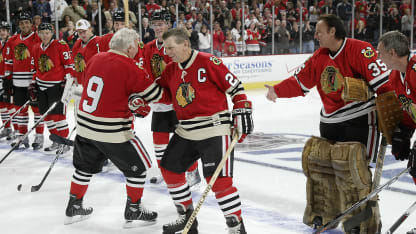
© Bill Smith/Getty Images
Blackhawks general manager Stan Bowman grew up with retired legends around a hockey team; his father, Scotty, coached the magnificent Montreal Canadiens of the 1970s, when icons like Maurice "Rocket" Richard, Jean Beliveau and Dickie Moore were familiar figures in the hallways of the Montreal Forum.
Stan Bowman says that a modern team has a great many fans who aren't concerned about the past.
"But in Chicago, we have a whole other group of fans who lived and died with Bobby and Stan and Tony and Denis," he says. "They love the current players but they remember these guys from when they were kids. They were their heroes. Rocky and John have brought these legends back into the fold, heroes for the people who have kids and grandkids and want to tell them who Bobby Hull was when they were a kid."
That was clear at the Blackhawks' season ticket holder event this month. Three generations of fans, most of them never having seen the ambassadors play, lined up for more than an hour in their vintage jerseys to have their photos taken with Hull and Esposito. Some were stunned speechless when it came time to shake hands with two smiling icons.
"The other benefit to this is for our players to be around them," Bowman says of the ambassadors. "They're very engaging people, right? Even though they don't have a lot in common, the game is different now, they tell funny stories and I know our players enjoy when they come around to talk about what things were like in their day."
Captain Jonathan Toews, for one, says he enjoys being around the ambassadors and has appreciated the chance to interact with them.
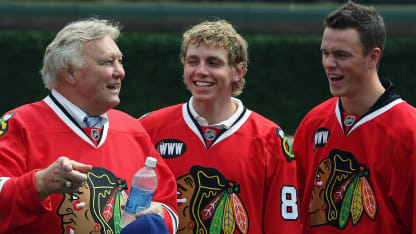
© Jonathan Daniel/Getty Images
"You can go down the list of other great former players and I think that keeping those guys around is one of the things that the Blackhawks do so well," says Toews, who is in his 11th season with Chicago. "Seeing them at the United Center and other events that we have is a constant reminder of how great they were and what they meant not only to the game, but to the Blackhawks and the city of Chicago."
At Blackhawks practice on Saturday, longtime Chicago fan Gary McLain, 57, of Naperville, Illinois, spoke of the legends with great affection.
"When I'm watching the game and they show Bobby Hull, Stan Mikita or other greats, I know (broadcaster and former Blackhawks forward) Eddie Olczyk always references how John McDonough and Rocky Wirtz brought back the history and some of the Blackhawks greats back into the fold," McLain said.
"I grew up a fan of the Blues," the St. Louis native said, "and watching those older Blackhawks -- the Bobby Hulls and the Mikitas against Garry Unger and the Plagers (Bob, Bill and Barclay). We could never seem to beat the Blackhawks, so you knew they were rich in the history of the Blackhawks. And [for those guys] to be away and then see the organization has come full circle is very good."
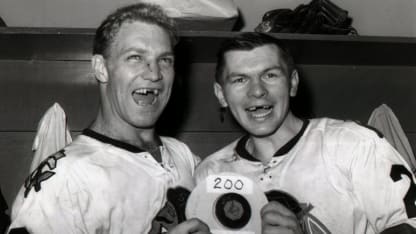
© B Bennett/Getty Images
To Quenneville, the frequent presence of Hull, Esposito and Savard is a reminder of the Blackhawks' tradition and history.
"It's great the way they carry themselves and represent the organization," he says. "You know it was something special from their playing days, the way the Blackhawks have this connection with the city and the community. Just seeing these guys, you can see it and feel it and capture that rich tradition that's there. We're fortunate to be part of something special around here."
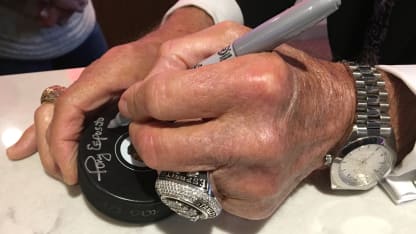
Hull, 78, and Savard, 56, live in the Chicago area and attend many Blackhawks home games. Esposito, 74, lives in Tampa and flies in for short stretches; he came north for the Dec. 3 game and the Dec. 4 season ticket holders event at Chicago's Museum of Science and Industry, then returned home before coming back on Dec. 8 for the Blackhawks' three-game homestand and a flurry of public appearances.
"That's the bridge, the credibility, the history, the essence of this franchise," McDonough says of the ambassadors. "When we brought Bobby and Stan and Tony back, our fans did not have a reference point to the past. I don't know really what the situations were, if they were persona non grata or they weren't welcomed here, but I came from a culture in baseball where, when our (Cubs) players left -- Billy Williams and Ernie Banks and Ryne Sandberg and Ron Santo and Fergie Jenkins -- they were welcomed back. They were part of the fabric of the franchise."
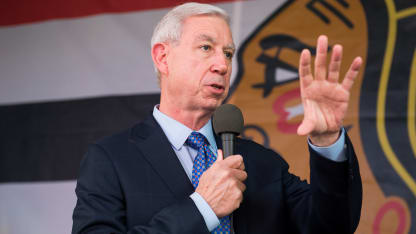
© Bill Smith/Getty Images
The job descriptions and responsibilities fashioned for the Blackhawks ambassadors didn't take long to write, McDonough says.
"They were this," he says of a blank page he tore from a pad on his desk. "We wanted to treat them so well that they would want to be here on a regular basis. I didn't want to put something down where Bobby had to be here 30 games and Stan had to be here 25 games, I wanted to treat them so well and make sure this experience for them was so enriching that they would want to be here."
The embrace of Hull, Mikita and Esposito was a stroke of genius by Wirtz and McDonough, says Bob Verdi, a highly decorated former newspaper reporter who in 2010 was hired by the Blackhawks as their historian.
"I want to say two or three days after John got the job (in November 2007), as if he doesn't have enough of a mess on his hands, he calls me and asks, 'Do you have a number for Tony Esposito? And Stan?' " Verdi says. "For him to think of that with all this other stuff going on …
"So many of these guys left here on bad terms. Hull, Mikita, Esposito, Doug Wilson, Steve Larmer, it was automatic that it would be an awkward departure. Stan said he didn't feel welcome in the building. That's an amazing, terrible thing. When John called him, Stan said, 'I've been waiting 30 years for this phone call.'
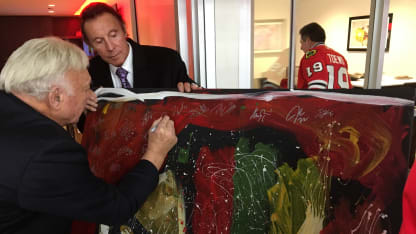
"Obviously, John had a handle on how these guys had left, awkwardly and bordering on worse than that. Bobby said returning to the team changed his life. Tony's not that dramatic but he didn't leave here properly; I think he read in the paper that he was being retired. John nailed it when he said, 'We have to get out of the grudge business.' Even [Savard], who was a hero around here, was fired four games into a season. It was a tough decision but what they've done for him since then, they've treated him so well."
The ambassadors, Verdi says, "aren't window dressing. The team wants them to move around, and they want to do that. It was way overdue, the respect that they're being shown now. It's just a whole different vibe here now.
"Stan and Bobby helped put this franchise back on the map. In the mid-1950s, this was Siberia. They were playing games in neutral sites, there was talk of them moving altogether to St. Louis. Then (goalie) Glenn Hall comes in, Bobby and Stan. And Savard, after Bobby left, helped fill the building again."
\\*
Hull, his mobility not what it once was, is steering his motor scooter toward United Center Suite L36, waving to the fans calling out to him as they ride arena escalators. He climbs off the machine and notes the Blackhawks logo on the back of the seat, saying, "They think of everything, don't they?"
Once inside, he is gently swarmed by team sponsors, jersey-wearing fans who bask in his glow and that of Esposito and Savard. Hull happily poses for photos and signs the many things offered for his familiar autograph -- pucks, photos, miniature banners, programs.
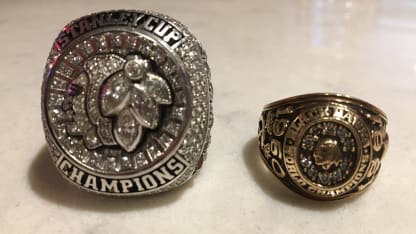
His Stanley Cup rings are a hit, the one from his 1961 championship almost looking like a Cracker Jack prize next to the 2015 boulder that he and his fellow ambassadors were given.
Hull's voice is still gravelly, his vocabulary as salty as ever. He lights up at the opportunity to dust off his French with a reporter from Montreal, unleashing a playful streak of surprisingly good profanity.
"I was taught well by Pierre Pilote," he jokes of the late Blackhawks defenseman from Quebec.
Later, in McDonough's suite, having polished off a plate of sushi, Hull recalls in fine detail his separation from the Blackhawks in 1972. With the WHA on the horizon, he says, an attempt by Chicago management to keep him was "feeble, and they put me in a corner. I said, 'Oh yeah? I don't stay in a corner for very long. You can't score from there.' One thing led to another, the WHA kept after me and you know the rest of the story."
Hull played seven seasons for the Jets in the WHA and, after that league folded, returned to the NHL for a combined 27 games with Winnipeg and, finally, the Hartford Whalers.
"I knew that I wasn't welcome here," he says of Chicago. "After I retired, I thought I was at sea. I wasn't a Blackhawk and I wasn't a Jet."
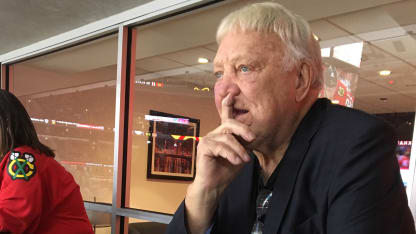
In his earliest days as president, McDonough reached out to Hull by phone, and his first overture wasn't warmly received.
"I wasn't mad at John," Hull says. "But I let my feelings be known about the group before -- Billy Wirtz and Pulford and that gang. I was just letting John know the reason I hadn't been around here for 35 years."
McDonough says with a laugh, "The first conversation didn't go well. I might have been a little bit light on my offer. I spent 24 wonderful years in baseball and I had heard profanity in three or four different languages. But I had never heard it in French before. Bobby let it go pretty good."
At least the ice was broken, and Hull soon sat down with Wirtz and McDonough.
"When John asked if we could talk again, I said, 'We can talk all you want. I don't have a job,'" says Hull, who remembered Rocky Wirtz as a kid who ran around the Blackhawks dressing room when his father was the owner.
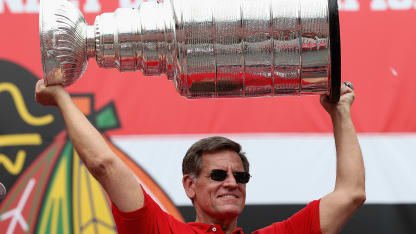
© Jonathan Daniel/Getty Images
"Rocky said, 'Are there any hard feelings with the new regime?' And I said, 'Not one little bit with the way I see you're running things.' Rocky took a broom and swept the place clean. He hired the guys from the Cubs (McDonough and Jay Blunk, executive vice president of business operations) and I've never seen a better marketing group than John and Jay and that group. They put the games on TV that the fans hadn't been able to watch. Rocky did everything for the fans. To this day, he doesn't do anything unless he considers how it's going to affect our fan base. He says, 'Is it good for them? If it is, then it's good for us.'
"All of a sudden this happens," Hull says brightly of rejoining the Blackhawks. "It was the greatest thing that ever happened to me.
"The best part of this is knowing that you're wanted after having spent 15 years here, appreciated for what I tried to do for the club. Rocky knew what I'd done and he wanted to compensate me for that with this job.
"It's such a great feeling to know that people remember you for what you did. If I'd have played here for 15 years and not done a (darn) thing, no one would remember. I'd have thought I'd been here for naught. But everyone remembers what I did, how I did it, how I entertained them. We're in the entertainment business and that's what I tried to do."
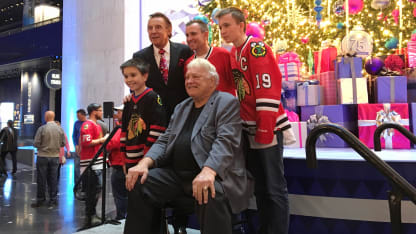
And that's what Hull continued to do in Suite L36 and the following night at the season ticket holders event, where "The Golden Jet" would feel much more of the love, sitting for 90 minutes with Esposito standing at his side at the base of a four-story Christmas tree, posing for about 200 photos with almost a thousand happy fans. He was beaming as broadly for the last photo as he was for the first.
\\*
A famous scene in Martin Scorsese's 1990 film "Goodfellas" shows Henry Hill and his future wife, Karen, played by Ray Liotta and Lorraine Bracco, entering a nightclub through a service entrance. They navigate tight corridors, walking around corners and through the kitchen, Henry happily greeting bouncers, waiters and the manager by name before he and Karen arrive at a stageside table that appears out of nowhere.
This, in a way, is Esposito at United Center. He enters the arena through the back door with a hello for Frankie, a Blackhawks employee he's known since the latter was a parking lot attendant in the early 1970s, then greets a bustling stream of security guards and kitchen and maintenance staff, many by name.
"There are a couple of electricians here who have to be 80 years old but they're still on the payroll," says Esposito, his monogrammed shirt punctuated with cuff links that are silver miniatures of his iconic mask.
"They can retire when they want. They will never be fired. Rocky says, 'They're here, and that's it.'"
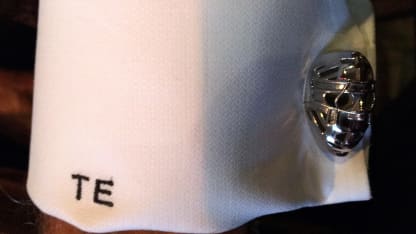
The former goalie says he's more familiar, indeed more comfortable using the employee entrance of arenas.
"It reminds me of being a player, of coming to work," he says. "It's all part of the excitement and atmosphere of hockey. You feel it. I love when the anthem ends and it's game on."
Esposito recalls being at home in late 2007 when he took a call from McDonough, who asked him whether he wanted to discuss returning to the Blackhawks family as an ambassador with Hull and Mikita, his old friends and teammates.
"It was a wonderful feeling," he says.
Esposito made arrangements to fly to Chicago the next day to explore the idea, but poor weather at O'Hare and Midway airports canceled those plans.
"We rescheduled for the following day. But that afternoon, we spoke on the phone and agreed to a deal," he says. "John and Rocky said they didn't even need to see me. Coming back was a great, natural progression after my playing and management days and I was very happy to be involved again with the Blackhawks. I couldn't ask for a better situation than this."
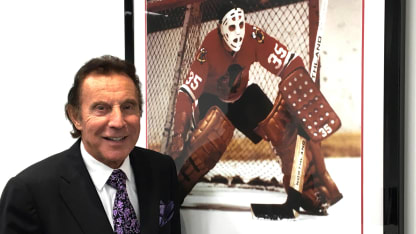
We leave United Center in the final moments of the Blackhawks' 3-1 loss, Esposito having chatted in the suites with adoring fans, signing their pucks and jerseys, telling evergreen stories. Our ride down to ice level is aboard a freight elevator ("the trash elevator," as he calls it), where two employees are pushing huge rolling bins overflowing with empty beer cans.
"Big night, huh?" he jokes with them, insisting that he take one heavy bin off the hands of a female staffer, rolling it out at the loading dock.
We're driven back to our hotel, Esposito having said good night to every arena employee we passed on the way out and shaken hands again with Frankie at the door. At two bars within a slap shot of our hotel, 33 years past his final game, Esposito is recognized by every bartender and almost every patron. Those serving his beer, which he pours himself, won't take his money, but he tips generously, and as we walk back to the hotel near midnight, 13 or so hours after his long day had begun at the Tampa airport, he's nodding to a pancake house across the street.
"Three eggs, great bacon and the best pancakes," he says, grinning, with the voice of experience. "But I won't be there early."
\\*
Savard began and ended his 1,196-game NHL career in Chicago. After 10 seasons, he was traded to the Canadiens in 1990 for defenseman Chris Chelios, then signed as a free agent in 1993 with the Tampa Bay Lightning. He played a season and a half for them before being traded back to Chicago late in the 1994-95 season and finishing his career in 1997.
Savard is grateful for having won his only Stanley Cup championship with the Canadiens in 1993, but the Blackhawks are truly in his blood.
"Growing up, I never thought I'd play in the NHL, let alone be here today, coming to Blackhawks games, representing the team at events," he says. "The life they've given me here, as a player and as an ambassador, has been a blast.
"The team calls this a job but it's not work for me. It's fun. With my personality, this role fits me really well. I've grown pretty close to everybody I work with. The stuff this organization does, they always say yes. They operate their business that way with their fans and their sponsors. Even with us [ambassadors], we ask for something and they find a way to get it done."
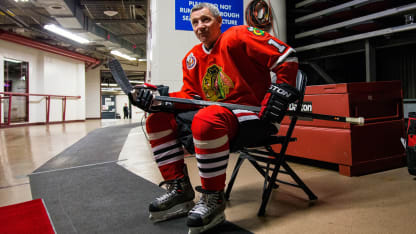
© Chase Agnello-Dean/Getty Images
Savard, pointing to the Blackhawks' motto of "One Goal," says management's commitment to winning impresses him the most.
"That's tough to do with today's (NHL) salary cap but they're willing to pay the price, do whatever they need to do," he says.
Sitting in Suite L36, he nods at Hull, larger than life with fans clustered around him.
"I said to one of our executives that when Bobby and I sit to talk before a game, he should have a camera and microphone in here," Savard says with a laugh. "You think you've heard all the Bobby stories? I don't think so. Tony has great stories, too, but he'll listen more. And Stan … we miss him dearly."
\\*
The Blackhawks' turnaround has been dramatic since Wirtz and McDonough took control, a case study in successful management and business operation. Chicago has qualified for the playoffs in eight of their nine seasons at the helm, won three Stanley Cup championships and gone to the Western Conference Final two other times while attendance has skyrocketed.
From a dismal 12,727 average attendance in 2006-07, ticket sales rose by about 4,000 per game the following season, and the Blackhawks have led the NHL every season since, with United Center jammed to more than 100 percent capacity with standing room. Their sellout streak stands at 432 games; 368 in the regular season, 64 in the Stanley Cup Playoffs.
And the Blackhawks are fully invested in the community. On Monday, they opened MB Ice Arena, a $65 million, privately funded practice facility that is expected to be a boon to youth and adult hockey in Chicago.
The return of Hull, McDonough says, "was kind of a lightning bolt" for the renaissance of the Blackhawks. "And the same thing for Stan, for Tony and for Denis after that. Their decision to return, and our first outdoor game at Wrigley Field (the 2009 Bridgestone NHL Winter Classic against the Detroit Red Wings), were kind of the flashpoints.
"I look at the team we have now and the analogy that I would use is this: This group is not necessarily your parents' team or your grandparents' team. Today's fans have put a stake in the ground and this is their team -- Patrick (Kane) and Johnny (Toews) and Corey (Crawford) and (Brent) Seabrook and Duncan Keith, that whole group. It's been a great decade. But we're hoping that the engine is just warming up here. What Bobby and Stan and Tony and Denis have added to all of this is immeasurable."
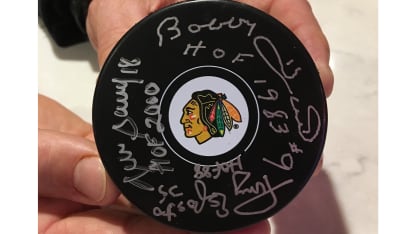
McDonough sees a warmth in the relationship between the ambassadors and those who are delighted to have these icons back in their midst.
"Their return brings many fans back to a period in their lives where there was some innocence, when life was just a little easier, when they didn't necessarily have the responsibilities that they have now," McDonough says. "These legends played a big role in life experiences. These fans can remember where they were in certain instances that are etched in their memories because of these players. I think that's a wonderful thing to have brought back."
The president laughs at the notion that Esposito has just called him "boss" down the hallway.
"Tony was my hero, so 'boss' sometimes doesn't compute," he says. "The Golden Jet is back. For a lot of people, that has a lot of substance. Stan Mikita, Tony O, Denis Savard. These are Hall of Famers on and off the ice. We struck gold with all of them."
-- NHL.com staff writer Tracey Myers contributed to this report
